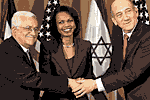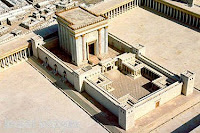"The 2006 Anti-Semite of the Year Award" by: Tamar Yonah
 Sunday, February 18, 2007
Sunday, February 18, 2007This is a must read article by Tamar Yonah. I have linked it here so that my readers can be informed as to the outrageous anti-Semitism of this former President of the United States, and to condemn his recent book shamefully entitled, " Palestine: Peace, not Apartheid". We must stand-up against such obvious anti-Semitism, and to always be vigilant to call it's perpetrators to account.
And the Winner Is .....
" And The 2006
Anti-Semite of the Year
Award Goes to ...... "
Original post
by: Tamar Yonah
I was doing a radio show last week when this idea came to mind. Read on...
If I said that you (the reader of this article) was a spy for a foreign country, you would laugh it off. Because who am I? I am relatively unknown and don't hold any international prestige. But if Henry Kissinger, or someone else famous in the political arena published a book and named you as a spy, you would take that VERY seriously. So would anyone else reading that book, because Kissinger served in a very high position, therefore it would be assumed that he would know, right?
Conversely, if Iranian Leader Mahmoud Ahmadinejad said the State of Israel was the reason that there is no peace in the Middle East, and that the Jews were practicing Apartheid, most people around the world who have even a simple grasp of political realities would know that he is an anti-Semite, and therefore would not take what he says as having any validity. They KNOW he is an anti-Semite and that he wants to destroy the nation of Israel.
This is why the new book written by former U.S. President Jimmy Carter called, 'Palestine: Peace, not Apartheid' is so dangerous. Jimmy Carter always seemed to show himself on camera as a very gentle, soft spoken southern gentleman, devoted to his religious beliefs, and almost always with a smile on his face, showing he was a warm and non-threatening person. But beneath that friendly looking smile seems to lie a deep prejudice against the Jewish people.
Monroe Freedman, (now a professor of law at Hofstra University), served on the Holocaust Memorial Council during Carter's term as president. Part of his job was to present to Carter, names of those to be approved for the board of the Holocaust Memorial Council. In an article that was published in World Net Daily, January 25, 2007, ?Jimmy Carter: Too many Jews on Holocaust council? about 80% of the board members Monroe recommended were Jewish, the rest were Gentiles. Freedman said that after submitting his list, Carter complained. Monroe says his memo was returned with a note, in Carter's handwriting, and initialed by him, on the upper right hand corner stating "Too many Jews". Monroe was then given instructions by the White House to add more non-Jews to the board of the Holocaust Memorial Council. After compiling a new list, another legitimate candidate was rejected. Monroe stated in the article, "I got a phone call from our liaison at the White House saying this particular historian whose name sounded Jewish would not do. The liaison said he would not even take the time to present Carter with the possibility of including the historian on the board because he knew Carter would think the name sounded too Jewish. I explained the historian is Presbyterian, but the liaison said it wouldn't matter to Carter."
Who would imagine this sort of anti-Semitism behind Carter?s benign smile and soft spoken voice?
As to the title of Carter's new best seller book, 'Palestine: Peace not Apartheid' :
According to the Merriam-Webster dictionary, the word 'apartheid' means:
1 : racial segregation; specifically : a former policy of segregation and political and economic discrimination against non-European groups in the Republic of South Africa
2 : Separation, Segregation
None of these are true for Israel. There is no racial segregation in Israel. Arabs who are CITIZENS of the State of Israel not only live together with us, but serve as teachers, doctors, lawyers, and judges in Israeli courts. They are elected and serve in the Knesset, Israel?s parliament. Arabs who are citizens of Israel enjoy more freedoms here, than in their own Arab countries where dictatorships and oppressive Islamic laws abound.
For Jimmy Carter to claim that Israel denies rights to a person due to his/her race is preposterous. Carter obviously does not know the meaning of the word Apartheid which he uses in the tile of his book. I KNOW what apartheid is.
I visited South Africa in the late 70's when Apartheid was in affect there and saw it in action. There were separate busses, separate bus stops, separate bathrooms, separate schools, just about separate 'everything' there. Black South Africans certainly weren't allowed to live in the open suburbs where the white people settled. And it wasn?t only if you were black. Apartheid applied to all 'colored' people. That means if you were from a place like India, and were brown skinned, it categorized you as a 'colored' and so you did not enjoy the rights of the 'White' race.
Perhaps Carter wants to portray Israel as racist because of Arabs who complain about having to go through security check points on the roads? If so, this is a false claim of apartheid.
Because of the Arab terror that threatens Israel daily, IDF soldiers are stationed in vulnerable spots on roads leading to heavily populated cities. All vehicles traveling these roads, regardless if they are Israeli or Arab, must pass through these check points. Soldiers scan all vehicles in an attempt to catch suicide bombers or vehicles smuggling in explosive devices . This means, even if you are Jewish, and have served in the army (IDF), you too will have to wait in (sometimes) long lines to be checked before you are allowed to continue on to Israeli population centers. There is nothing racial here. All suffer this inconvenience, Jews and Arabs alike. Yet Carter says that Israel ?perpetrates even worse instances of apartness, or apartheid, than we witnessed even in South Africa?, Haaretz news service reports.
Harvard Law professor Alan Dershowitz attempted to de-bunk Jimmy Carter through a public debate, on the contents of his book, ?Palestine: Peace not Apartheid?, which was filled with errors, omissions, and an anti-Israel bias. But the former U.S. President declined to debate the Professor. This, after Carter said the reason he wrote the book was because he wanted to encourage more debate! So then why is he running from it?
And so, one can only come to the conclusion that Jimmy Carter is, under his soft words and gentle smile, an anti-Semite, and a dangerous one. He seems to hide this anti-Semtism under a friendly smile, while conspiring to do harm to the Jewish people.
It is time to start a new awards ceremony, exposing the anti-Semites of the world who hide under innocent masks and clever words. Because if it was a Nazi writing lies about the Jews, the average person would know better. Not so when these lies come from a former U.S. president, purporting to be an honest broker for peace.
We need to identify people who operate like this, to let the world know who is an anti-Semite, and so give the average person a little foreknowledge. One should know when reading books like Carter's, that he's known for being an anti-smite, then they can take his word with more than a grain of salt when he talks about Israel and the Jewish people.
And so... (drum beat please), we award former U.S. President Jimmy Carter, the 2006 'Anti-Semite of the Year' award.
Congratulations Jimmy, you earned it!
by Tamar Yonah @ 4:50 AM
 This man is very dangerous, as Tamar points out in her post. Why is he so dangerous ? He is dangerous because he is a former President of the United States of America, and people will listen to him, even if he is wrong. It's not that he is not a learned man, he is. It's that he chooses to ignore the TRUTH, and to promote vicious lies instead.
This man is very dangerous, as Tamar points out in her post. Why is he so dangerous ? He is dangerous because he is a former President of the United States of America, and people will listen to him, even if he is wrong. It's not that he is not a learned man, he is. It's that he chooses to ignore the TRUTH, and to promote vicious lies instead.He is deserving of this award, and I hope that in the future he will keep his opinions to himself, and stick to things he knows more about, like peanuts !!
Jimmy Carter - '2006 Anti-Semite of the Year' Award Recipient
Link





















